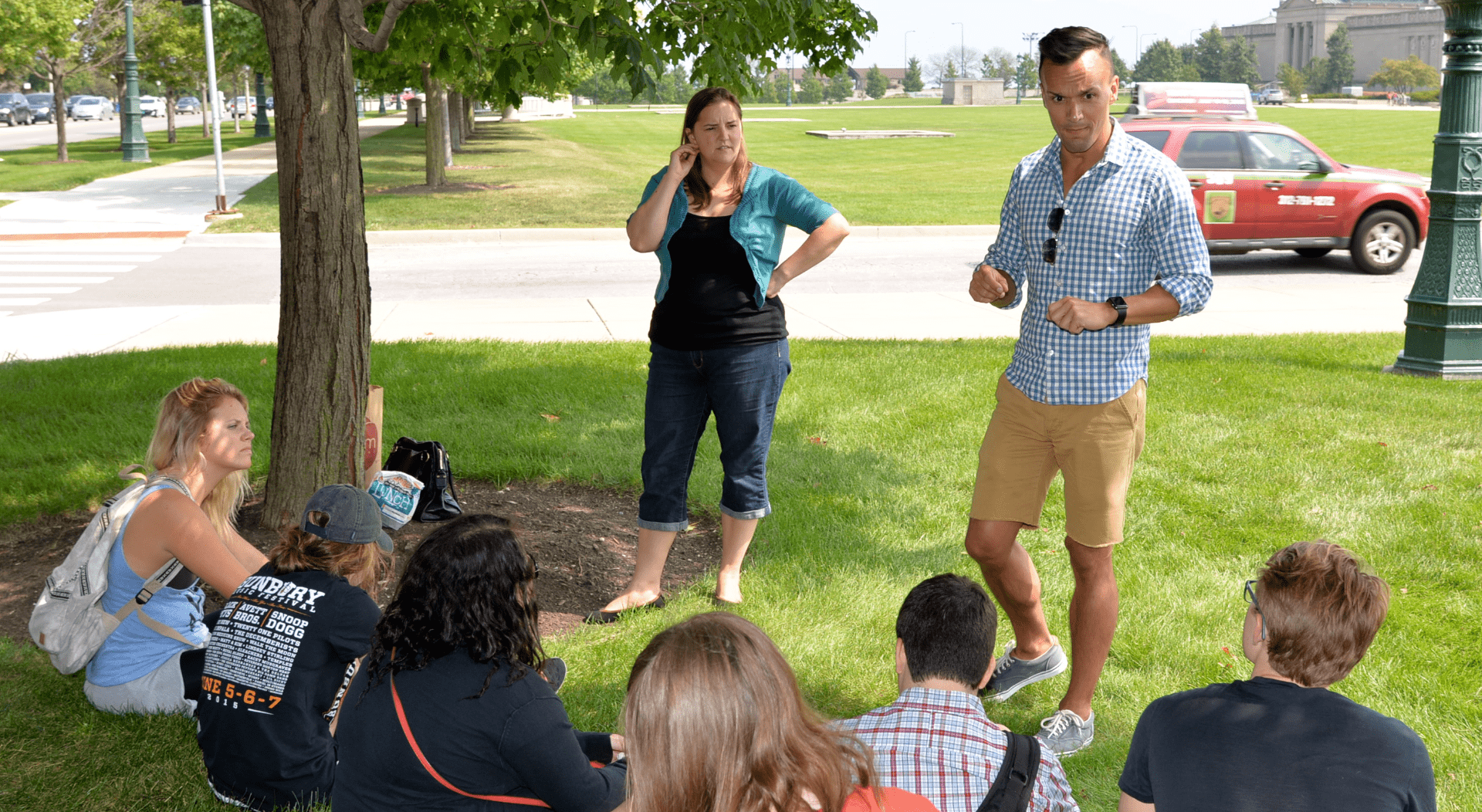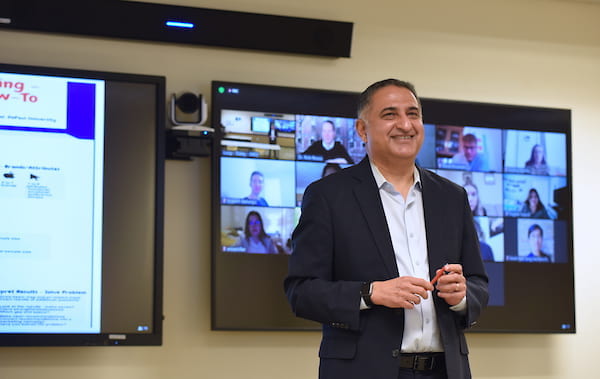
With the Museum of Science and Industry as an unconventional backdrop for his class, Associate Professor Jim Mourey introduces students to improvisation techniques designed to help them become better leaders. | Photo by Kathy Hillegonds
Driehaus College of Business faculty members are known for bringing real-world experiences to the classroom, but perhaps lesser known are some of the innovative ways they are weaving those experiences into learning opportunities for students.
Take Associate Professor of Marketing Jim Mourey, for example, who integrates improvisation techniques into his classes. What does comedy improv have to do with business? According to Mourey, more than you might think.
Mourey’s expertise is in consumer behavior, but he has been involved in improv and comedy writing since the fourth grade and is a graduate of the conservatory at Chicago’s famous comedy club, The Second City. His two passions come together in his teaching methods that combine “a little bit of comedy and entertainment,” Mourey says.
Improv training can help students become better business leaders, and Mourey’s got the data to prove it. His recent study on the effects of improv on learning found that students familiar with improv techniques tend to be more creative, are more collaborative and have a higher level of self-efficacy.
There are 10 major tenets of improv, and the most important is to approach situations with a “yes, and” mentality, he says. By implementing “yes, and,” you agree to an idea presented to you and add something new to it. “Students who take my classes go on to seek people who share the same values they’ve learned in improv,” Mourey explains. “They begin to identify the ‘yes, and’ people from the naysayers. The ‘yes, and’ people are more likely to bring solutions to the table.”
One improv activity Mourey uses is called “Five Things.” “It’s a creative brainstorming exercise where I say the name of a brand and students have to say five things they think of as quickly as possible. It’s fun and it makes people laugh, but what you’re really doing is trying to break down this fear of putting ideas out there.”
“Improv training teaches skills that are useful in business, but also in life,” Mourey says. “I’m giving my students tools they can use whenever they need them. If they’re in a situation where one method isn’t working, maybe they’ll say, ‘Hey, let me try using this other method that Jim taught me.’”
Thinking Outside the Textbook

Associate Professor Kelly Richmond Pope created an e-learning game that immerses accounting students in a financial fraud “whodunit.”
Associate Professor of Accountancy Kelly Richmond Pope goes to great lengths to engage students and get them excited about forensic accounting. Last year, with DePaul Academic Growth and Innovation Fund support, she developed an innovative e-learning platform called “Red Flag Mania,” an immersive, online “whodunit” game that challenges students to use data to uncover financial fraud at a fictional organization.
Pope explains: “Textbooks are not engaging. It’s hard to get excited about a story you read about, but what if you are in the story? That was the inspiration behind ‘Red Flag Mania.’ I thought, what if I can give students the beginning and middle of the story and have them solve the end? Learning through immersion is impactful because it gives students an opportunity to apply what they learn and have fun doing it.”
Playing to the Strengths of the Virtual Space

Associate Professor Zafar Iqbal enlisted DePaul alumni working in 10 different countries to be live guest speakers for his online class. | Photo by Kathy Hillegonds
It’s not just about converting content to an online format; it’s about reimagining the delivery of that content in ways that are not possible face-to-face. That’s when you truly start to innovate.”
When the world moved online in 2020, Associate Professor of Marketing Zafar Iqbal had never taught virtually before. But it wasn’t long before he converted the challenges of online teaching into opportunities for his students.
“I experienced a mental shift when I realized that time and space were no longer constraints,” he says. “I could bring in speakers and have students work with clients from literally anywhere around the world.”
Iqbal is director of DePaul’s Integrated Marketing Honors Program, which enrolls a cohort of no more than 30 undergraduate students in an intensive, yearlong experience that involves three major consulting projects for real businesses. By the end of the program, students emerge with 30 weeks of real-world consulting experience.
“Because working together on projects in real time is important, I quickly decided that the program must be taught synchronously [live classes that meet at a specific day and time online],” says Iqbal, who over the past year has had his students work with businesses located from California to Japan.
Utilizing the newest of the business college’s technology-enhanced classrooms, Iqbal was able to expand his online teaching techniques. First, he maximized class time. “I could use the [electronic] whiteboard and discuss course content with one group while sending another group into an online breakout room to solve a problem,” he says, “and they wouldn’t miss anything because they could watch the discussion recording later.”
Second, he reimagined the alumni career panels that he incorporates into his classes. “For the first time, I was able to host a global alumni panel. I invited alumni who work in 10 different countries,” he says. “We just had to agree on a time zone, and the world was suddenly in our classroom.”
Another technique Iqbal uses involves structuring course content into a controlled sequence to build upon a narrative. He strives to create an integrated experience versus having his videos available all at once, like a playlist that could potentially be watched out of order.
“There are strengths to each teaching modality, so in order to be successful you need to learn and leverage those strengths,” Iqbal shares. “It’s not just about converting content to an online format; it’s about reimagining the delivery of that content in ways that are not possible face-to-face. That’s when you truly start to innovate.”
By Nadia Alfadel Coloma